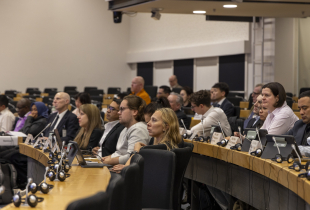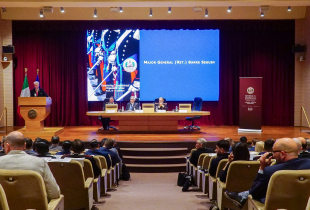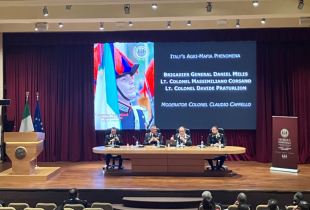
Marshall Center’s Newest Alumni With 1st from Chad Set to Combat Transnational Organized Crime
By Christine June
Public Affairs Office
George C. Marshall European Center for Security Studies
GARMISCH-PARTENKIRCHEN, Germany (April 21, 2016) – Chadian Army Maj. Modeste Lougneba is the first from his nation – one that is besieged by terrorism and corruption – to become part of the 11,000 plus alumni network of security-building professionals working together to combat this centripetal and multi-headed enemy.
“Networks defeat networks, which means we need to cooperate and put our forces, ideas together to tackle this threat of transnational organized crime,” said Lougneba, who is the deputy chief of training at the Army Headquarters in the Republic of Chad, a landlocked country in Central Africa, bordered by Libya, Sudan, Central African Republic, Cameroon, Nigeria and Niger.
Lougneba and his fellow 83 participants from 59 countries graduated April 21 from the Program on Countering Transnational Organized Crime at the George C. Marshall European Center for Security Studies.
Held twice a year, the program focuses on 21st century national security threats as a result of illicit trafficking and other criminal activities.
"There is an increasing recognition that transnational organized crime is growing in size and influence in a world increasingly marked with globalization and diminishing importance of borders," said Professor Steve Monaco, the CTOC program director. "Transnational organized crime surges into gaps of opportunities and is, frankly, threatening governments."
How globalization along with technology and connectivity have dramatically changed the contemporary security environment was stressed by the graduation speaker, Deputy Assistant Secretary of Defense for Counternarcotics and Global Threats in the Office of the Secretary of Defense Caryn C. Hollis.
She told the participants about the U.S. DOD priorities and that the Department of Defense is working on a new strategy to address the broader challenges of disrupting illicit threat networks that threaten U.S. national security interests by providing support to U.S. and international law enforcement partners.
The objectives of the DOD strategy , explained Hollis, is for the U.S. and partner nations to develop layered, coordinated approaches that regularly disrupt the operations of TOC organizations and networks, and limit their access to funding so as to reduce their assets and raise the costs of doing business.
“All of the things that we have been talking about in class are similar to what we have in New Zealand but on a smaller scale,” said Detective Superintendent Virginia Karen Le Bas, police detective with the National Operations Manager Organized Crime in New Zealand. “I now see how we can be connected with the rest of the world to solve these issues.”
Marshall Center’s CTOC program examines the major methods by which transnational criminal and terrorist organizations engage in criminal activities for profit, said Monaco.
The course design includes guest lecturers from national and international law enforcement and security organizations, course seminar activities discussing the range of government countermeasures to combat criminal activity, and strategy development exercises that focus on best practices and international approaches to combating these growing threats against national security.
“Learning from these lectures, I can see how the military in some parts of the world are actively dealing with transnational organized crime,” said Indonesian Presidential Security Service Lt. Col. Budi Wirman, head of training for Cavalry Weapons Centre and Doctrine in Indonesia.
He explained that in his country the police have responsibilities to combat transnational organized crime activities. “After hearing some of the lectures and learning from my classmates, maybe we (Indonesian military) can assist the police and be more involved with stopping TOC in our country.”
Participants heard lectures from subject matter experts from United Nations Office of Drugs and Crime, The White House Office of National Drug Control Policy, Costa Rican Intelligence Service, Latvian Criminal Bureau, Colombia Prosecutor’s Office, Interagency Operations Center, U.S. Department of Justice, U.S. Drug Enforcement Agency, Europol, U.S. Department of Homeland Security, U.S. Naval Criminal Investigative Service and U.S. Defense Intelligence Agency.
“Transnational organized crime is an area focus for my command so this course will help me going forward like building my contacts and understanding the different agencies that are out there that can assist in countering TOC,” said U.S. Army Capt. David Solich, deputy chief for the Center for Special Operations at the Joint Intelligence Support Element, Special Operations Command North.
This CTOC course had a good mixture of participants who work at defense, legislative, interior and justice ministries, and law enforcement and other government agencies. The class was almost 50 percent military, 40, and civilians, 44. Participants’ location represented six U.S. Combatant Commands’ area of responsibility: U.S. Africa Command; U.S. European Command; U.S. Central Command; U.S. Northern Command; U.S. Pacific Command; and, U.S. Southern Command.
“In this course, we have different actors from all over the world talk about their transnational organized crime problems and how they have developed policies and tactics to counter TOC. It’s very important to learn from each other because TOC is a global problem, but the solutions are local,” said Eduardo Vázquez Rossainz, center director of the Immediate Response Emergency at the Secretary of Safety and Municipal Transit from the Ministry of Security and Traffic in Mexico. “So the experience that we are developing in each country, with each local capacity, has been addressed in this course, which is good for the future in countering the TOC problem.”
With the addition of the nation of Chad, the Marshall Center now has alumni in 152 countries.


